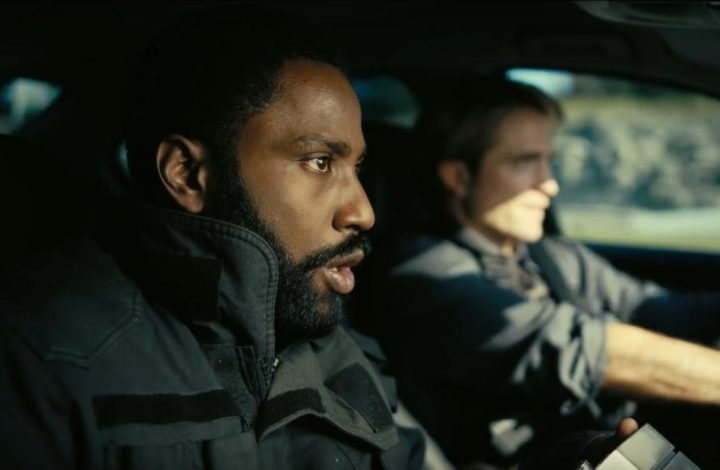
MPAA Rating: PG-13 | Rating: ★★★★
Release year: 2020
Genre: Action, Sci-Fi, Thriller Director: Christopher Nolan
Tenet is Christopher Nolan’s most overtly theological and philosophical film to date. The movie opens with a character welcoming John David Washington’s unnamed Protagonist into the “afterlife” and closes with another key character’s statement of having “faith” in the mysterious mechanics of the universe. Building its premise on a combination of the mysterious Sator Square, quantum mechanics, and Nolan’s own apparent obsession with the phenomenology of time, Tenet is like a mashup of Shane Carruth’s Primer, first-person shooter video games like Call of Duty, and the James Bond film franchise. That description may delight or disgust you; indeed, like so much in our contemporary era, reception of Nolan’s filmography seems to be increasingly divided between quasi-religious diehard fans and firm skeptics/decriers. The former love the “WHAAAUUUHHHHMMMM” of Hans Zimmer scores (Tenet is scored by Ludwig Göransson), the massive explosions and chase sequences, and the high-concept mind-bending “whoa” visuals and narrative schemes; the latter are bored by the drowned-out over-long exposition, emotionally-aloof characters, and the hyper-masculinity of it all (Nolan’s films aren’t generally known for their female characters beyond the Dead Wife trope).
I thus find myself as a critical outlier—a “Nolan centrist,” if you will—in that I appreciate the positives of Nolan’s filmography while also recognizing the validity of many of the critiques. I was dismayed to see how Nolan pushed for Tenet to be released in theaters during a global pandemic. I was more receptive to his critique of Warner Brothers’ recent decision to release their entire 2021 slate of films to streaming. I find the hyperbolic praise of Nolan from online fanboys to be tiresome, but I also think Nolan’s films are genuinely innovative and thrilling, and more cinematically and philosophically complex than any other Hollywood blockbuster films being made today. It’s this paradox of popular accessibility and arthouse opacity which has prompted me to write an academic monograph on Nolan’s cinema and philosophical theology, tentatively titled Theology and the Cinema of Christopher Nolan: Transcending Time and Narrative (Lexington Books/Fortress Academic, forthcoming 2022). Tenet is the final film I consider in the monograph, and it’s the perfect bookend—the film is a thematic return to Nolan’s earliest indie films, Following and Memento, yet encased in big-budget Hollywood ornamentation. That is, Tenet is a “time travel movie” in more ways than one—it’s a story depicting an original vision of how human beings might use advanced technology to conquer the linearity of time, as well as a cinematic mode of returning to images and ideas throughout Nolan’s oeuvre on the far side of experiential knowledge.
A lot of stuff happens in Tenet, and to attempt to summarize the plot threads with a typical film review synopsis feels almost irrelevant. In short, objects and persons can be “inverted” in their entropy, and thus move backwards in time while everything else around it moves forwards. Tenet centers on the Protagonist, a CIA operative recruited into a mysterious organization fighting to save the world from a destructive threat emanating from the future. The film employs both blockbuster spy tropes and video game logic to move the Protagonist from scene to scene, set piece to set piece, in order to have an infiltration, a fight scene, a car chase, a rescue, etc. There is a Villain, Russian billionaire arms deal Andrei Sator (Kenneth Branaugh, chewing up the scenery); a Woman in Distress, Sator’s wife, Kat (Elizabeth Debicki); a Charming Sidekick, Neil (Robert Pattinson); a Rival Arms Dealer, Priya (Dimple Kapadia); a Q-like scientist who explains things, Barbara (Clémence Poésy); and, finally, Michael Caine (because it wouldn’t be a Nolan blockbuster without Michael Caine, now would it?). There are numerous MacGuffins—plutonium, an algorithm, a Goya painting forgery, Sator himself—and lots of “exotic” international locations—Ukraine, India, Vietnam, Italy.
At one point, in demonstrating the inversion of time by “catching” bullets, Barbara the Scientist tells the confused Protagonist: “Don’t try to understand it. Feel it.” It’s as if Nolan were speaking to the audience himself, inviting them to simply go with the flow of the film and enjoy the ride. And while I’ve seen that many audiences didn’t particularly enjoy the sound design or incoherent dialogue when watching Tenet in theaters, I found my experience watching it from the comfort of my own home to be remarkably thrilling (so much for the superior “theatrical” experience, eh Nolan?). In a few sequences, Nolan pushes the boundaries of cinema to its very limits, with on-screen characters and objects simultaneously moving backwards and forward in time in ways which still baffle me. I appreciate Nolan’s love for cinema as both a technology and an art form, a machine which allows us to manipulate the experience of time in remarkable ways, as well as reimagine the ways narratives are structured and understood. I applaud the cinematography of Hoyte Van Hoytema, as well as the keen editorial skills of Jennifer Lame; with their powers combined, Tenet becomes much more than just a James Bond replica. Indeed, much of Tenet‘s story operates like a palindrome, and when I realized how the narrative would unfold (having experienced a scene already at an earlier point in the film), I found myself more delighted and impressed than disappointed or bored. Tenet succeeds in somehow transcending the audience’s basic understanding of time and narrative while nevertheless keeping them engaged and entertained for the film’s entirety. And I haven’t even explored the questions Tenet raises about ethics, destiny, free will vs. determinism, and politics. I’ll save those topics for the book. Live on time, emit no evil.
IMDB Listing: https://www.imdb.com/title/tt6723592/
Leave a Reply